It’s game time! Board games that can help people ‘level up’ their capacity for transdisciplinary work
Suzanne Webster · | Applying Science |At IAN we are constantly invested in various transdisciplinary projects. Transdisciplinary projects partner interdisciplinary research teams with stakeholders outside of academia to synthesize diverse knowledge and experience and generate novel insights on a particular topic. For example, when IAN develops report cards, our Science Integrators and Communicators work with partners to synthesize relevant information on a specific ecosystem and then communicate key messages to a targeted audience. Transdisciplinary approaches are effective for addressing complex problems; however, this path to knowledge co-creation is often fraught with conceptual, interpersonal, and logistical challenges.
Dr. Daniel Stokols argues that successful trandisciplinarians often possess a constellation of collaborative and communicative values, attitudes, beliefs, behaviors, and skills that enable people to thrive in this challenging and dynamic environment. These characteristics form an individual's "transdisciplinary intellectual orientation" and allow a person to be more productive and comfortable in their role as a transdisciplinary researcher or practitioner. These characteristics come more naturally to some people than to others, but it is important to note that they can be learned and practiced!
In this blog I will highlight several of the characteristics that Stokols describes and recommend a few of my favorite board games that can help people 'level up' their capacity for transdisciplinary work:
Ability to integrate insights and individual talents—Pandemic
Transdisciplinary projects often assemble a team of people with diverse knowledge, skills, and interests. It is important that individuals on the team are aware of the strengths and weaknesses of each of their collaborators (and of themselves!) in order to strategically solve problems. In this popular cooperative game, players work together to treat infections and discover cures for four diseases. Each player has a unique ability associated with their character, and the team must share ideas and collaboratively develop an action plan that best employs individuals' talents. (Other games: Betrayal at House on the Hill, Dead of Winter)
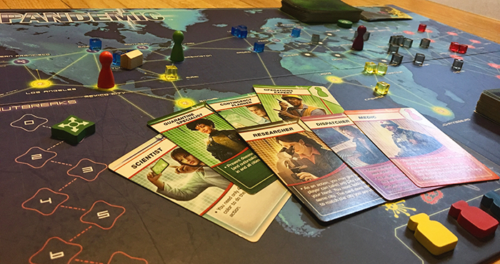
Negotiation and diplomacy—Catan
Managing relationships and resolving intellectual or interpersonal disagreements is absolutely essential when collaborating with numerous partners with different personalities, backgrounds, and opinions. Even in the face of conflict, transdisciplinarians, at their core, must believe that the benefits of collaborating with others outweigh the costs of doing so. This popular game challenges players to build the most expansive civilization on the game board. Players negotiate trades for limited resources and must be willing to concede to sacrifices and compromises in order to succeed. (Other games: Bohnanza, Cosmic Encounter)
Tolerance for uncertainty and risk—The Resistance
Because the transdisciplinary approach is relatively unpredictable and has many moving parts, taking risks is not only inevitable, but also encouraged. As Thomas Jefferson once said, "with great risk comes great reward". In this game, players are secretly assigned the role of either a resistance fighter or a spy, and must convince other players to vote to include them on resistance mission teams. Players must commit to "life or death" decisions based on limited information, and no matter how certain success seems, there is always a chance of failure. (Other games: Risk)
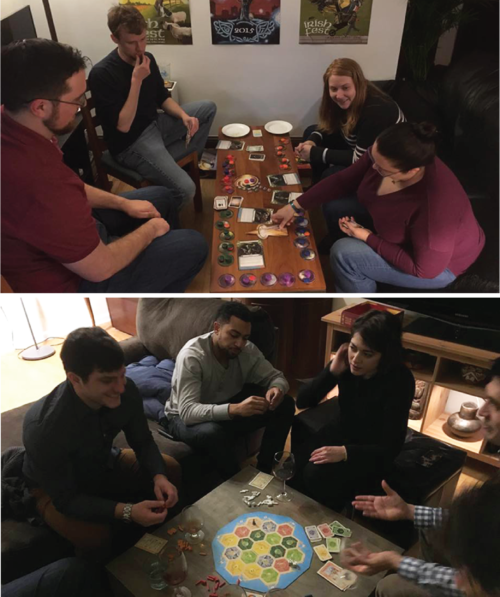
Persistence with complex tasks—Ticket to Ride
It is important to be able to continue working towards a goal even when logistical, interpersonal, and conceptual challenges arise midway through a project. In this board game (and app!) players compete to build the most profitable railroads on a map by fulfilling railway contracts between specified destinations. Space and time are limited, so players must lay track quickly and strategically, and work around route blockages when other player blocks a direct path.
Open-mindedness—Sherlock Holmes Consulting Detective
Transdisciplinarians should recognize that there is often more than one effective way to accomplish a goal or solve a problem, and they must be willing to listen to new ideas and try others' approaches. In this game, players take on the role of Detective Holmes's assistants and work as a team to disentangle a mystery. Using a choose-your-own-adventure-style case book, players must decide which leads to follow as a team, searching documents for clues, exploring a map of London, and conducting interviews in order to solve the case in as few turns as possible.
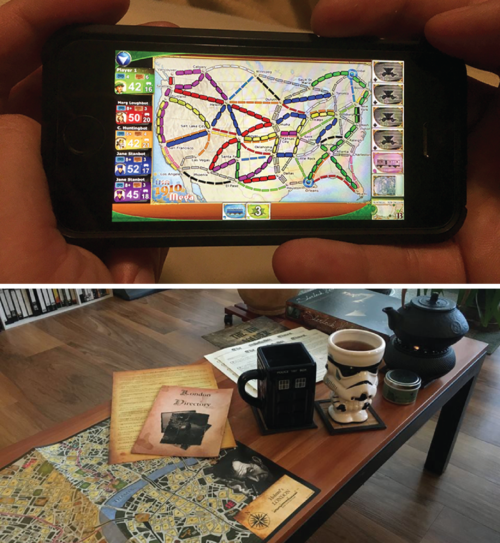
Ability to traverse multiple levels of analysis—7 Wonders
It is important to be able to think clearly and simultaneously within numerous contexts and across multiple scales. For example, people involved in transdisciplinary projects need to be able to reconcile short-term and long-term goals, manage multiple priorities, and satisfy the needs of diverse stakeholders. In 7 Wonders, players must compete to strategically develop great cities. Individuals must balance how they invest time and energy towards meeting immediate needs for raw materials, infrastructure, and military with reaching the end-game goal of amassing the most overall points. (Other games: Tikal, Patchwork)
Adaptability—Star Fluxx
When working on transdisciplinary projects that involve many stakeholders, partners must be able to adjust their visions and strategies as the goals and expectations of a project change with time. Board game players often need to have an overall strategy to succeed; however, in the game Star Fluxx, the rules of the game fluctuate with every turn, as do the requirements to win. Players must adjust their strategies accordingly, and continue to progress through the game despite the ever-changing conditions of success.
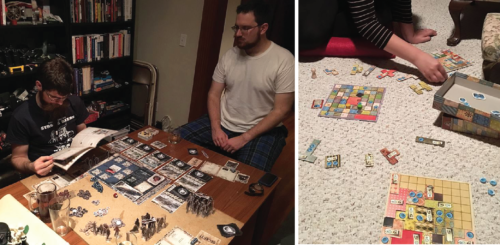
Creativity—Dixit
Having a creative mind allows a person to generate innovative solutions and explore novel ways of seeing or communicating that do not necessarily come to mind right away. In this game, one player must use their imagination to craft a cryptic phrase that describes the dream-like artwork on their card without giving away too much detail. All other players must resourcefully and secretly select a card from their own deck that also fits the description and then everyone must guess which card is the original piece of art. (Other games: Once Upon a Time, Spyfall)
Effective communication—Exit: The Game
People who work in a transdisciplinary space must be excellent communicators who can facilitate respectful communication between partners, even with added challenges and frustrations such as extensive multitasking, interdisciplinary translation, and limited face-to-face contact. This game is an escape room in a box—players must solve interwoven puzzles to successfully exit a themed 'locked' room. Time is limited, so all players simultaneously complete puzzles and communicate discoveries so that the team can organize and synthesize all of the information and progress through the overall challenge. (Other games: Hanabi, Magic Maze, Escape: The Curse of the Temple)
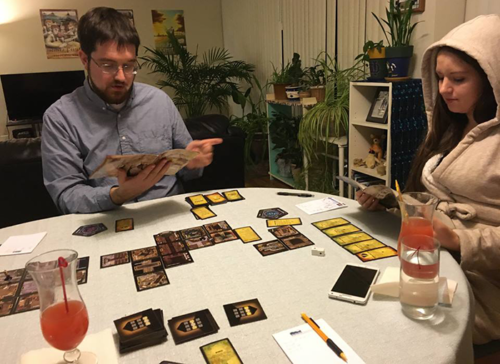
Playing board games is a fantastic way to learn many of the skills that are necessary for working in a transdisciplinary setting. For each of us, some skills come more naturally than others, but we can all practice self-awareness and take action to learn new strengths with practice, and from teammates and mentors. I want to express my gratitude to my colleagues and mentors at IAN for helping me develop some of these characteristics over the last several years. I also want to thank all of my game night buddies who are always helping me to become not only a better researcher, but also a better person. Game on!
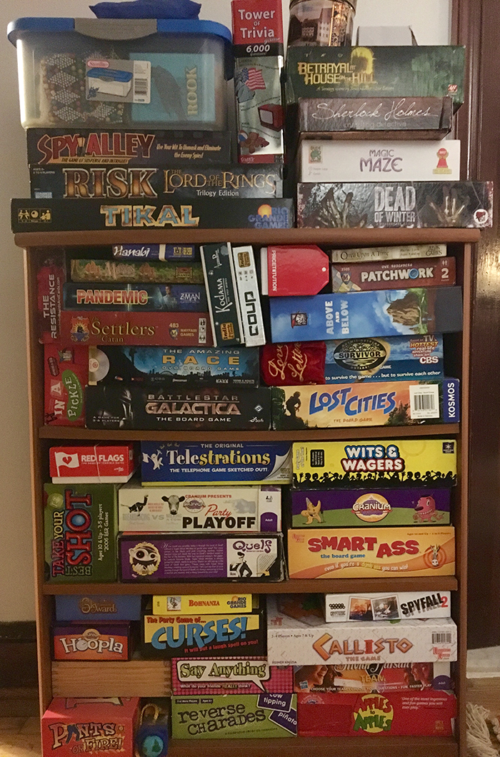
Resources:
1. Stokols D. Training the next generation of transdisciplinarians. In: O'Rourke M, Crowley S., Eigenbrode, S., Wulfhorst J., eds. Enhancing communication and collaboration in interdisciplinary research. New York, New York: Oxford University Press; 2014:56-74.
2. Spitzer, S. How to improve interdisciplinary collaborations: lessons learned from scientists studying team science. IAN Press; May 31 2018.
3. Lang DJ, Wiek A, Bergmann M, Stauffacher M, Martens P, Moll P, Swilling M, Thomas CJ. Transdisciplinary research in sustainability science: practice, principles, and challenges. Sustainability science. 2012 Feb 1;7(1):25-43.
About the author
Suzanne Webster
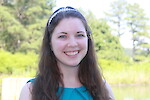
Suzi Webster is a PhD Candidate at UMCES. Suzi's dissertation research investigates stakeholder perspectives on how citizen science can contribute to scientific research that informs collaborative and innovative environmental management decisions. Her work provides evidence-based recommendations for expanded public engagement in environmental science and management in the Chesapeake Bay and beyond. Suzi is currently a Knauss Marine Policy Fellow, and she works in NOAA’s Technology Partnerships Office as their first Stakeholder Engagement and Communications Specialist.
Previously, Suzi worked as a Graduate Assistant at IAN for six years. During her time at IAN, she contributed to various communications products, led an effort to create a citizen science monitoring program, and assisted in developing and teaching a variety of graduate- and professional-level courses relating to environmental management, science communication, and interdisciplinary environmental research. Before joining IAN, Suzi worked as a research assistant at the Marine Biological Laboratory in Woods Hole, MA and received a B.S. in Biology and Anthropology from the University of Notre Dame.